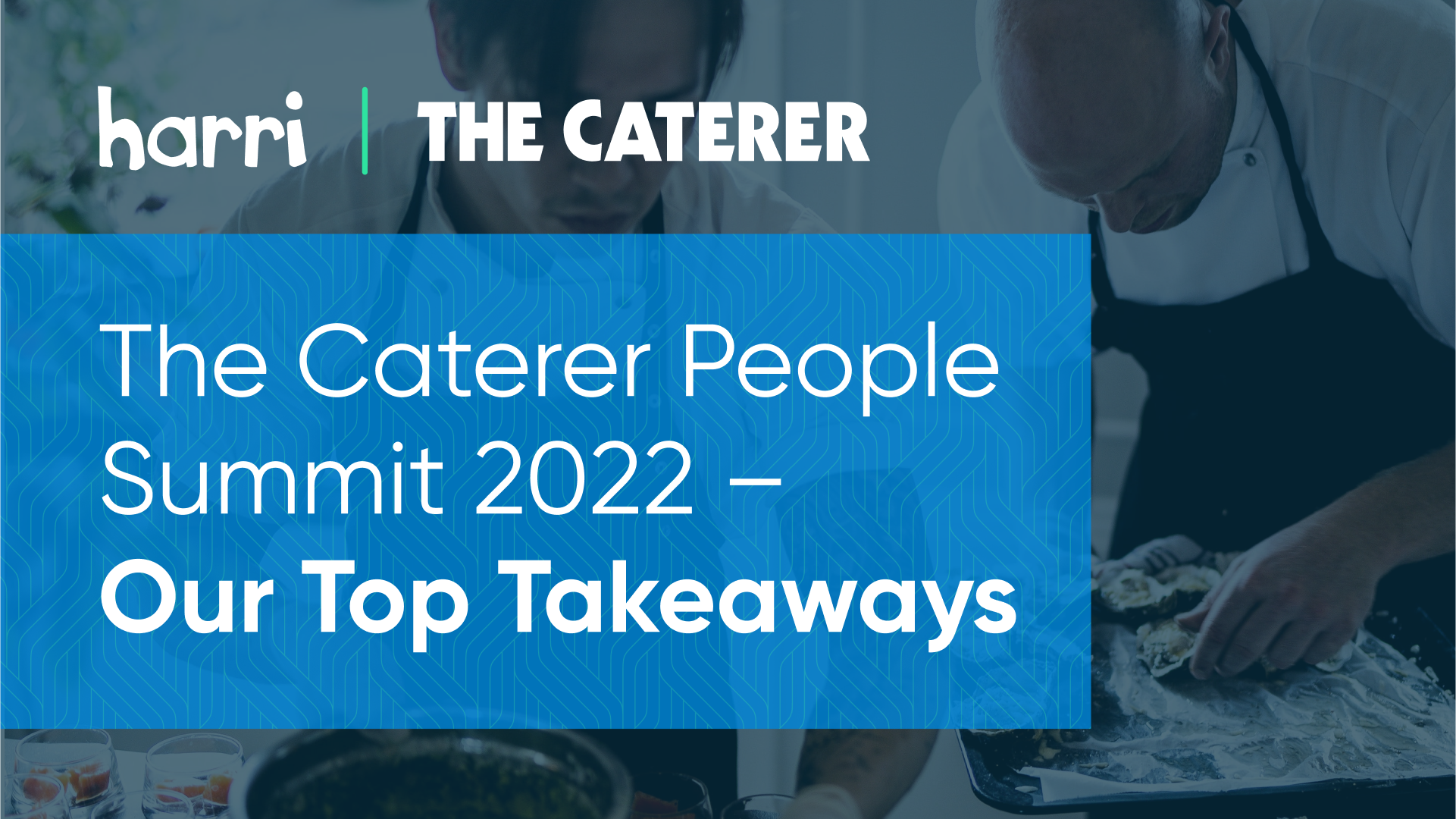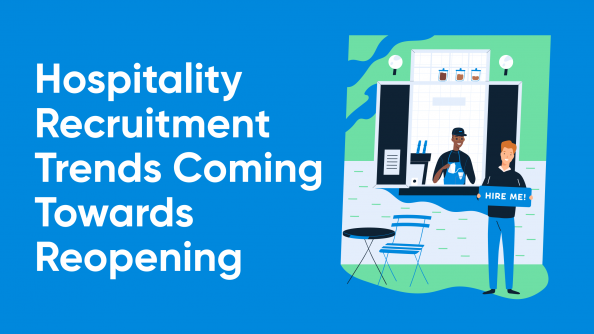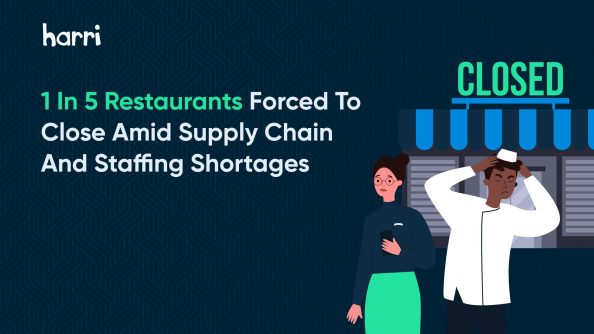The Caterer People Summit 2022 – Our Top Takeaways

- By Harri Insider Team | June 14, 2022
Harri was delighted to be a sponsor of The Caterer’s 2022 People Summit, which returned to being a live in-person event for the first time since the pandemic. The theme of the event was ‘changing it up’, with delegates able to glean invaluable advice and insights from industry experts who have adapted the way they support and engage with their staff post-pandemic.
Much of the discussion focused on how operators have managed to retain their staff, and how they have changed their processes to ensure teams are avoiding burnout and mental health issues. Here we pick out some of the highlights from the day, starting with our very own founder Luke Fryer, talking about tech’s role in staff retention…
Tech talk
While the double impact of the pandemic and Brexit have resulted in a major focus on hiring, Harri CEO Luke Fryer argued that staff retention (or “our leaky bucket problem”) has to be at the very top of your agenda.
With such a limited talent pool available, holding on to the staff you’ve got is an absolute imperative, especially as it’s “painfully expensive” every time you lose an employee. Luke suggested operators run a term report to look at the number of employees who leave in less than 90 days; look at the start date and finish date and add up the total wages paid to find out the true cost of that loss.
He said it will work out at about 25-35 % of net profit, and with 50% of new recruits leaving in less than 90 days, it really demonstrates the need to keep your staff happy right from the start.
Aside from the direct cost of losing staff, Luke said there are indirect costs through the associated deterioration of the guest experience every time a team member leaves.
“Companies that consistently have lower employee turnover numbers excel in guest count, sales growth, consistency of brand experience and service delivery.”
Of those workers that leave in the first 90 days, 65% do so because they’re not happy with their schedule, so Luke advised that operators pay particular attention to this area.
“The DNA of scheduling is that it’s very much about the number and pattern of hours…if either of those shift abruptly, that’s a trigger for employee turnover,” said Luke.
Instant access to wages is also important to today’s hospitality workers, as are clear paths to career development, flexible working arrangements (facilitated by good workforce management technology), consistency of teams, and ease of engagement with colleagues in a more “social” manner.
Harri’s report
The importance of all of these factors and more were revealed in Harri’s recently released Transforming the Employee Experience in Hospitality report, for which 5000 hospitality workers were surveyed.
Luke said the report also revealed workers’ desire for technology to be used far more in the industry to help them in their roles, especially for “really manual grind type tasks”.
“Our employees are sophisticated digital consumers, they know what good technology looks like, they expect that in the workplace.”
Luke also explained how tech is essential to facilitate good communication within your business.
“If there’s one thing we learnt in Covid, it’s incredibly difficult to actually get the message through to our frontline employees. Most of our messaging technology we use in hospitality is focused on our office teams, and perhaps that gets down to our unit-level managers…but actually getting the message through to a frontline worker, the people that matter most and carry a message through to our customers, that’s not something we’re good at. So we have to find ways to get those communications worked into compulsory daily or weekly workflows, [for example] I’m looking at my rota, tie a communication into that, I’m clocking in, I’m clocking out, tie messaging into that.
“Communication as an ad hoc discretionary function doesn’t work, it has to be tied into something they’re already doing, and as we’ve learnt, the noticeboard doesn’t work anymore,” said Luke.
Empathy is essential
Lastly, Luke spoke of how the “art of retention” boils down to being “an empathetic employer”, and that tech can help you gauge how employees are feeling so you can show them empathy for their “circumstances, ambitions and anxieties”.
He suggested that managers use existing data to look at things like whether an employee is coming to work on time, whether they’re getting enough hours, completing training, how they interact with performance reviews and whether they’re reading their messages – all of which are “indicators of engagement and sentiment” which enable you to predict whether an employee intends to stay or leave. He revealed that Harri is working on a dashboard that managers can use to view all the indicators for every employee in one place, thus enabling them to use “predictive retention” and, ultimately, “scale empathy”.
The subject of empathy was explored in detail during a panel debate on ‘new management skills’ which asked: ‘are empathy and listening skills top of the agenda?’
The panellists – Anita Bower, people and culture director at Iconic Hotels, Karen Baybutt, managing director of Gilpin Hotel & Lake House, and Tim Foster, Head of Being Awesome at Yummy Pubs Co – spoke of how “soft skills” training is being given to managers as part of a realisation that staff wellbeing is fundamental to retention. Anita said: “It’s imperative to get to know your people – to ensure people are spoken to regularly, not just about work, but anything that’s troubling them.”
Tim agreed, saying it’s vital managers spend time on the shop floor listening to workers’ concerns so any problems can be resolved before they escalate to the point where a person decides to leave.
“Fix it [the problem] real quick, and they’re not going to go anywhere,” he added. Karen said talking to staff regularly is invaluable to find out what will make them want to stay in your business.
“You need to find out what motivates them because everyone is inspired by different things. It’s finding out what really drives that individual, and if you can get them to achieve what they want to achieve, providing it fits in with your business model, you are onto a winning formula,” she said.
Recruiting and retaining staff - how do you do it?
Another panel debate entitled ‘who is retaining and attracting their staff?’ explored ideas on how to recruit and hold onto staff in a post- pandemic and Brexit world. The panellists – Greg Hegarty, deputy CEO & COO at PPHE Hotel Group, KK Prabakaran, hotel operations manager at Dukes Hotel in London, and Katie Forrest, head of engagement, learning and development at Dakota Hotels – revealed how they had changed their approach to recruitment, with all three agreeing that with such competition for candidates, they had picked up the pace of candidate selection.
Greg said all candidates are now responded to and, if suitable, get an interview, within 24 hours of application. He explained that PPHE has also invested heavily in recruitment technology, has worked with heads of departments to get their “absolute buy-in” with recruitment, has re-evaluated job roles to make them more attractive, improved its “recommend a friend scheme” (with rewards paid to staff immediately), and has put procedures in place to fit candidates to jobs elsewhere in the group as suitable.
Greg said PPHE has also visited universities, taking some of its student recruits along to help convey the message that hospitality is a great industry to work in; Katie said Dakota had done the same with school-age children to educate them about the opportunities in hospitality.
When it comes to retention, all the panellists agreed that giving people job security (moving away from zero-hour contracts), flexible working that fits around their individual circumstances, clear career progression, and recognising their contribution to the business, are all vital in this new era.





















